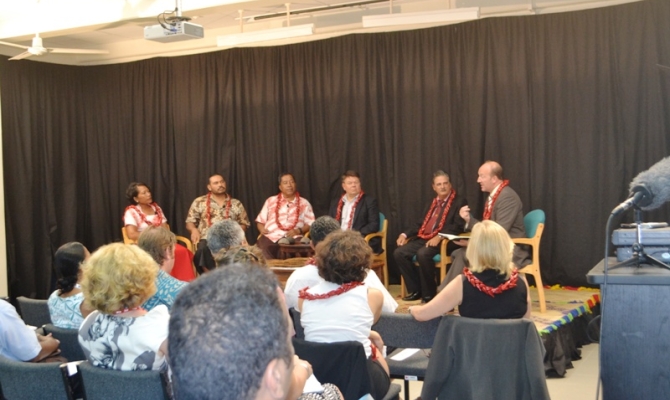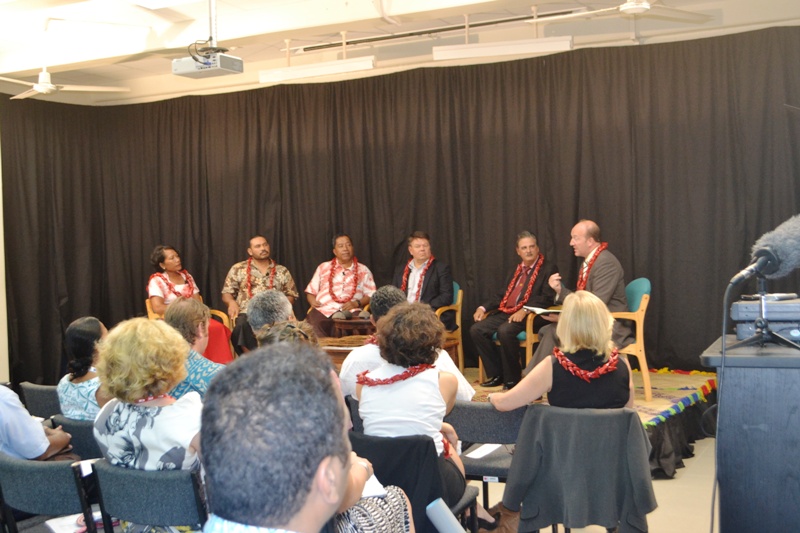
Climate Change Resilience
Makereta Komai, Editor PACNEWS
2 September 2014, Apia, Samoa - Leaders of Small Island Developing States (SIDS) have been challenged to prioritise investment in their meteorology and climate services because the end profit saves lives and properties.
That's the advice of Cuba's Weather Forecasting Services director, Dr Jose Rubiera, whose 20 years experience and strategies have saved thousands of lives and millions of dollars in economic losses.

Dr Rubiera was one of the panelists on a technical panel discussion in Apia Monday, titled "Managing Cyclones from Cuba to Samoa" moderated by BBC World Service presenter, David Eades.
Like Cuba, the host country of the United Nations SIDS conference, Samoa is working with donors and partners to improve communication of climate services to all its stakeholders.
Director of Samoa's Meteorology Division, Mulipoa Ausetalia Titimaea said Samoa is banking on the confidence of donors to support investment in its meteorology and climate services.
"It has been a step by step approach for us. While our partners and donors have dictated their own terms and conditions, we've learnt to be transparent in the way we use their funds."
"If they see that there is transparency and its working well according to our mutual partnership, they will go for a bigger size investment," explained Titimaea.
What has worked in Samoa's favour is government's institutional strengthening programme that ensured that its development plans are aligned with the requirements of the donor community.
"Given our experience with a number of disasters in the last decades, we are able to make better submissions based on what we have learnt from our own experiences. Donors will see what is working for us and provide assistance accordingly."
One of the challenges of convincing governments to invest in climate services is its link to socio and economic benefits.
"It's not really visible and we have to make it visible to our political masters. For example we have to show the link and economic benefits of investing millions into weather services infrastructure to our agriculture and health sectors."
"We are doing work in this area now, especially in agriculture," said Titimaea.
The island kingdom of Tonga faces an even daunting task when 85 percent of its National Met Service budget is allocated to staff costs and the rest to maintain its climate services.
"It's almost impossible to operate a network weather station with that kind of resources. But we've had to endure that and stretch our limited resources to provide timely information to our people," said Ofa Fa'anunu, the director of Tonga's Met Service.
Despite its struggles, the Tongan Met Service is investing in building the capacity of its personnel, with the assistance of the World Meteorological Organisation (WMO).
"We are hoping to train more weather forecasters. At one time, I was the only qualified forecaster and I worked 11 years without taking any leave. That is how stretched we are in our human resources," Fa'anunu admitted.
He said the international community must also take some blame for the vulnerabilities to climate change and global warming that small island developing countries are forced into.
"The international community has an obligation to assist and invest in the improvement and upgrade of our meteorological services. Global warming is caused by industrialised countries and we now live with its consequences."
"At the moment regular support is coming but the mechanisms are not quite ideal. Donors come and pilot project for 2-3 years and they leave because they have no interest in that area. We are left to find other donors to continue the project."
"What we need is partnership that is genuine and long term. We want something that is step by step to build the capacity of the country to allow us to eventually stand on our own two feet. This will also ensure long term sustainability of the project," said Fa'anunu.
The technical panel discussion is part of parallel side events organised for the UN Global Conference on Small Island Developing States underway in Apia, Samoa. The conference ends Thursday.
2 September 2014, Apia, Samoa - Leaders of Small Island Developing States (SIDS) have been challenged to prioritise investment in their meteorology and climate services because the end profit saves lives and properties.
That's the advice of Cuba's Weather Forecasting Services director, Dr Jose Rubiera, whose 20 years experience and strategies have saved thousands of lives and millions of dollars in economic losses.

Dr Rubiera was one of the panelists on a technical panel discussion in Apia Monday, titled "Managing Cyclones from Cuba to Samoa" moderated by BBC World Service presenter, David Eades.
Like Cuba, the host country of the United Nations SIDS conference, Samoa is working with donors and partners to improve communication of climate services to all its stakeholders.
Director of Samoa's Meteorology Division, Mulipoa Ausetalia Titimaea said Samoa is banking on the confidence of donors to support investment in its meteorology and climate services.
"It has been a step by step approach for us. While our partners and donors have dictated their own terms and conditions, we've learnt to be transparent in the way we use their funds."
"If they see that there is transparency and its working well according to our mutual partnership, they will go for a bigger size investment," explained Titimaea.
What has worked in Samoa's favour is government's institutional strengthening programme that ensured that its development plans are aligned with the requirements of the donor community.
"Given our experience with a number of disasters in the last decades, we are able to make better submissions based on what we have learnt from our own experiences. Donors will see what is working for us and provide assistance accordingly."
One of the challenges of convincing governments to invest in climate services is its link to socio and economic benefits.
"It's not really visible and we have to make it visible to our political masters. For example we have to show the link and economic benefits of investing millions into weather services infrastructure to our agriculture and health sectors."
"We are doing work in this area now, especially in agriculture," said Titimaea.
The island kingdom of Tonga faces an even daunting task when 85 percent of its National Met Service budget is allocated to staff costs and the rest to maintain its climate services.
"It's almost impossible to operate a network weather station with that kind of resources. But we've had to endure that and stretch our limited resources to provide timely information to our people," said Ofa Fa'anunu, the director of Tonga's Met Service.
Despite its struggles, the Tongan Met Service is investing in building the capacity of its personnel, with the assistance of the World Meteorological Organisation (WMO).
"We are hoping to train more weather forecasters. At one time, I was the only qualified forecaster and I worked 11 years without taking any leave. That is how stretched we are in our human resources," Fa'anunu admitted.
He said the international community must also take some blame for the vulnerabilities to climate change and global warming that small island developing countries are forced into.
"The international community has an obligation to assist and invest in the improvement and upgrade of our meteorological services. Global warming is caused by industrialised countries and we now live with its consequences."
"At the moment regular support is coming but the mechanisms are not quite ideal. Donors come and pilot project for 2-3 years and they leave because they have no interest in that area. We are left to find other donors to continue the project."
"What we need is partnership that is genuine and long term. We want something that is step by step to build the capacity of the country to allow us to eventually stand on our own two feet. This will also ensure long term sustainability of the project," said Fa'anunu.
The technical panel discussion is part of parallel side events organised for the UN Global Conference on Small Island Developing States underway in Apia, Samoa. The conference ends Thursday.